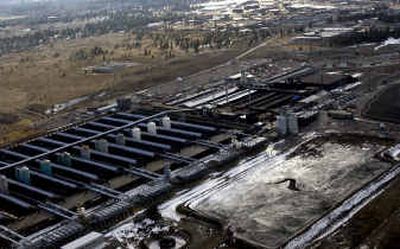Kaiser gets OK to sell Mead plant

Kaiser Aluminum Corp. said it has received Bankruptcy Court permission to sell its Mead smelter to a St. Louis company for about $7.4 million.
Kaiser also announced that it intends to sell a big refinery in Gramercy, La., for $23 million – a fraction of the cost the company spent rebuilding the plant during the last several years.
The sales are part of Kaiser’s strategy to reorganize under Chapter 11 bankruptcy protection.
Also this week, Kaiser reported that it lost $64 million during the first three months of the year.
Commercial Development Co. Inc. bought the idled Mead smelter with plans to rehabilitate the property for use as a small manufacturing park or temporary warehouse space.
CDC does not plan to restart the smelter, which last operated in December 2000.
Selling the alumina refinery in Gramercy nearly completes the company’s asset sales.
Earlier this year the company struck deals to sell a bauxite mine and alumina refinery in Jamaica for $295 million, as well as its large smelter in the African nation of Ghana for $18 million. Money from the sales will help satisfy some of Kaiser’s debt and give the company capital as it attempts to operate as a viable company this fall.
In the case of Gramercy, a business partnership between Century Aluminum Co. and Canadian firm Noranda Inc. submitted the $23 million bid, although the refinery will likely be subject to auction.
The two companies already buy up to 80 percent of Gramercy’s alumina output under long-term contracts.
The $23 million for Gramercy is relatively cheap considering Kaiser spent $275 million rebuilding the refinery after it was damaged by an explosion in 1999.
A company spokesman said Gramercy is fueled by natural gas, an expensive power source that may have driven down the price of the refinery. Although the price of alumina has soared, Kaiser has not been able to take full advantage of the increase because of contracts that set prices for years into the future.
Once Kaiser’s reorganization is complete, it likely will look much different than the influential firm that employed thousands in Spokane for five decades and rose to become one of the world’s largest aluminum companies.
Rather than making aluminum, a much smaller Kaiser will stick with making and selling fabricated aluminum parts, the company has said.
Among its factories should be the Trentwood rolling mill, where several hundred employees manufacture specialized aluminum sheet for aircraft makers such as Boeing.
Kaiser’s efforts to emerge from bankruptcy have been hampered by a stubborn economic recovery that’s boosting commodity prices, but hasn’t translated into higher margins on the sale of fabricated parts.
CEO Jack Hockema said the company has cut costs and boosted sales by 8 percent, although it hasn’t yet found a profitable mix.
In a press release announcing Kaiser’s first-quarter performance, Hockema said the company’s core business does hold promise.
The $64 million loss, or 80 cents per share, compares with a loss of $65.1 million, or 81 cents per share, during the same three months of 2003.
The losses were compounded by what Hockema called “legacy related expenses” which include retiree medical benefits and pension costs for hourly workers.
Such expenses for Kaiser will be eliminated later this year because of a deal the company struck with its unions that drastically cuts benefits.
Kaiser has until June 30 to file its plan of reorganization.